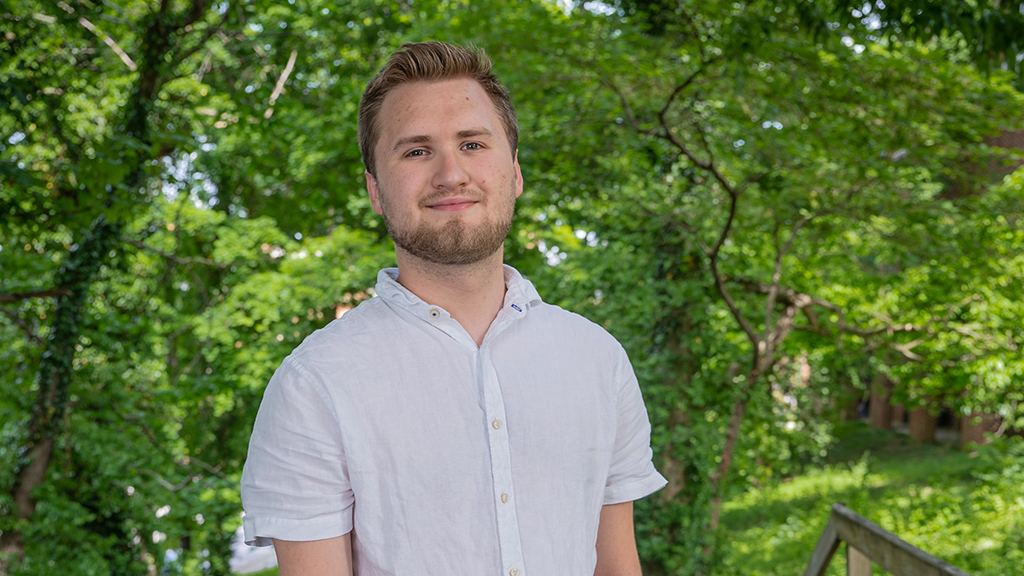Micah ’22
To Micah ’22, Appalachia means home. It means family. It also means hard work, and that is a value he carries with him throughout all he does. “There’s a real work ethic that people tend to believe in,” he said, “working hard to get what you want.”
Micah grew up in the heart of central Appalachia, near the historic Cumberland Gap on the land once inhabited by Shawnee and Cherokee peoples, where Daniel Boone blazed his historic trail. He spent his time split between Bell County, Ky., and Claiborne County, Tenn. Growing up there, however, he says he did not fully comprehend the rich history and culture of the area.
In his first semester at Berea College, Micah joined the Appalachian Male Initiative (AMI) and took a course on the history and culture of the region with Appalachian Studies professor Dr. Bobby Starnes.
“The Appalachian Cultures class I got put in my first semester, I learned so much that I didn’t know about the history of Appalachia and the kind of people who first were here and everything,” Micah said. “Bobby Starnes—she just absolutely knows so much that she was able to pass on a lot of knowledge to us.”
Along with the knowledge the students gain in the program, the AMI is meaningful because it provides a safe space for Appalachian males to be themselves.
Having a group that you fit into, people to look up to and people to talk to is important.
Micah ’22
“Having a group that you fit into, people to look up to and people to talk to is important,” Micah said.
Unfortunately, Micah says, misconceptions about issues like poverty and lack of education lead to some misunderstandings in the way non- Appalachians perceive people from this region.
“Some people think that Appalachian people are just lazy…or they don’t do anything, and that’s why they’re poor,” he said. “And they don’t really look deeper at the reasons why. I’ve seen a real value for education from Appalachian people. A lot of times the resources aren’t there, but I think the value is there.”
When he graduates in Spring 2022, Micah plans to attend physical therapy school. Whether he returns to Appalachia or moves elsewhere depends, he said,
on available opportunities.
In the meantime, through the AMI, Berea continues to recruit and retain more hardworking young men from Appalachia like Micah.
About the Appalachian Male Initiative
The Appalachian Male Initiative (AMI) launched in Fall 2016 and has since served approximately 135 students through 10 sections of the course. The program began with the intent to improve retention rates among Appalachian males, who typically had higher dropout rates compared to other students.
“[Retention] is obviously one of our primary goals,” said Rick Childers, AMI advocate and mentor, “but if you want to get to the root of that issue it takes a lot of foundational work of addressing the stereotypes they’ve heard about who they are and where they are from by teaching them the region’s rich history and culture.”
Students are enrolled in an Appalachian Studies course taught by Dr. Bobby Starnes. Her method of teaching engages the class in a blend of Appalachian history, historical artifacts, and critical thinking and writing exercises. Students also have the chance to bond with each other through hiking trips, canoeing, cooking and making traditional Appalachian crafts.
Not every Appalachian male who enrolls at Berea is selected for the program. Rather, the AMI works with Berea’s Admissions office to identify students who may benefit from the community that the program offers. Childers says an average of 30 students participate each year.
“This program gives students who might otherwise not feel comfortable coming to a college campus for the first time a community to surround themselves with,” Childers explains. “It’s a group of people who they can express themselves to without any fear of judgment or criticism.”
The AMI is currently conducting research and interviews of current and past participants to determine the success of the program and areas for development.



I was interested in Micah’s story as I came to Berea from Harlan Bell counties. My younger brother is now Mayor of Middlesboro (Rick Nelson). If Micah decides to return to his roots, he might contact my brother for some assistance.
Shirley,
Thank you for reading our student stories and reaching out on Micah’s behalf.
-Abbie Darst ’03
Editor